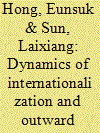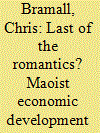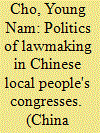|
|
|
Sort Order |
|
|
|
Items / Page
|
|
|
|
|
|
|
| Srl | Item |
| 1 |
ID:
074819


|
|
|
|
|
| Publication |
2006.
|
| Summary/Abstract |
The recent spate of English-language exposés of Mao Zedong, most prominently that written by Jung Chang and Jon Halliday, seems to announce a culmination of the tendency towards the temporal-spatial conflation of 20th-century Chinese and global history. This sense was only confirmed when the New York Times reported in late January that George W. Bush's most recent bedtime reading is Mao: The Unknown Story, or when, last month, according to a column in the British paper The Guardian, "the Council of Europe's parliamentary assembly voted to condemn the 'crimes of totalitarian communist regimes,' linking them with Nazism…" The conflation, then, is of the long history of the Chinese revolution with the Cultural Revolution, on the one hand; and, on the other hand, of Mao Zedong with every one of the most despicable of the 20th century's many tyrants and despots. In these conflations, general 20th-century evil has been reduced to a complicit right-wing/left-wing madness, while China's 20th century has been reduced to the ten years during which this supposed principle of madness operated as a revolutionary tyranny in its teleologically ordained fashion. In this way are the dreams of some China ideologues realized: China becomes one central node through which the trends of the 20th century as a global era are concentrated, channelled and magnified. China isglobal history, by becoming a particular universalized analytic principle, in the negative sense. That is, universality becomes a conflationary negative principle.
|
|
|
|
|
|
|
|
|
|
|
|
|
|
|
|
| 2 |
ID:
074815


|
|
|
|
|
| Publication |
2006.
|
| Summary/Abstract |
China's success in attracting the inflow of foreign direct investment (FDI) has been well documented. Less known is the initial success of China's "going out" strategy, which encourages domestic enterprises to participate in international capital market and to directly invest overseas. This article assesses the aggregate dynamics of China's outward FDI in a comparative prism. It traces the strategic shift of Chinese overseas investment in both arenas of government policy and corporate entrepreneurship. An emphasis is on the particularistic policies of the government and active responses of enterprises to the challenges and opportunities offered by globalization and the deepening reform. The article also discusses the strategic implications of emerging Chinese multinationals for their Western counterpart.
|
|
|
|
|
|
|
|
|
|
|
|
|
|
|
|
| 3 |
ID:
074817


|
|
|
| 4 |
ID:
074818


|
|
|
|
|
| Publication |
2006.
|
| Summary/Abstract |
The notion that the development strategy pursued in China after 1949 had transformed the economy of the People's Republic was a staple of Western scholarship at the close of the Maoist era. Jack Gray's work of the early 1970s stood squarely within this tradition. For him, Maoism was superior to Stalinism as a transitional path to socialism because it avoided the "urban bias" inherent in the primitive socialist accumulation suggested by Preobrazhensky, practised by Stalin, and advocated for China by (inter alia) Bo Yibo and Liu Shaoqi. Instead of extracting resources from the rural sector, the late Maoist development strategy revolved around labour accumulation: the mobilization of rural labour to carry out rural industrialization, agricultural mechanization and the extension of irrigation networks.
|
|
|
|
|
|
|
|
|
|
|
|
|
|
|
|
| 5 |
ID:
074820


|
|
|
|
|
| Publication |
2006.
|
| Summary/Abstract |
Accelerated agricultural collectivization in China was an inescapable consequence of the broader economic goal of socialist industrialization. Rightly or wrongly, this wider vision of China's future was imposed by Mao, and to judge the High Tide of agricultural collectivization of 1955-56 without regard to these wider objectives is a mistake. The collectivization represented an extensive growth that relied on labour mobilization to expand factor supply and to extend the crop sown area in a manner rationalized by the theories of Ragnar Nurkse. This strategy inevitably required bureaucratic control and coercion, depressed peasant consumption and the forced siphoning off of the agricultural surplus. As such its outcome should not be evaluated in terms of the neoclassical economic norms of income maximization, peasant incentives or efficiency in cropping patterns based on market prices.
In this framework, the post-Mao decollectivization and the readjustment of the agriculture-industry balance can be seen as a transition to an intensive agricultural growth strategy that was built upon the precise material legacy (expanded irrigation and drainage capacity) left behind by Mao. This strategy has proved to be remarkably successful in further releasing industrial growth from the agricultural constraint.
|
|
|
|
|
|
|
|
|
|
|
|
|
|
|
|
| 6 |
ID:
074816


|
|
|
|
|
| Publication |
2006.
|
| Summary/Abstract |
Editor's preface. It is unusual for The China Quarterly to publish anything in unfinished form, but the provenance of this piece by Jack Gray is equally unusual. In the second half of the 20th century, Jack was one of the UK's more important figures in contemporary Chinese studies, perhaps most noted for the text he produced in retirement, Rebellions and Revolutions: China from the 1800s to 2000. What follows here is an extracted version of a set of ideas he set down in 2003-04 for a manuscript on Mao Zedong, still in note form at the time of his passing in late 2004. It forms the core of a mini-symposium on reconsidering Mao on the 30-year anniversary of his death in September 1976. Mark Selden, Chris Bramall and Rebecca Karl offer responses to Jack Gray's views, and to the question of Mao's legacy in general.
|
|
|
|
|
|
|
|
|
|
|
|
|
|
|
|
| 7 |
ID:
074821


|
|
|
|
|
| Publication |
2006.
|
| Summary/Abstract |
The Sixth Plenary of the 11th Party Congress in 1981 gave a positive assessment on the transition period and the acceleration of the Chinese socialist transformation in the 1950s. Since 1987 China has witnessed active academic debates on the assessment and some contrary views have emerged. There was a sharp controversy between Mao Zedong and Deng Zihui in 1955 about the pace of transformation in agriculture and the result had a significant impact on the whole socialist transformation. The decision-making process coloured by a cult of Mao in the CCP was an important element in the origins of the major events taking place afterwards.
|
|
|
|
|
|
|
|
|
|
|
|
|
|
|
|
| 8 |
ID:
074814


|
|
|
|
|
| Publication |
2006.
|
| Summary/Abstract |
This article analyses the politics of lawmaking in Chinese provincial people's congresses. When the introduction of a market economy and governance according to law policy compelled the Party to open the political arena of lawmaking, the political process in China became more consultative and sophisticated, and political actors more diversified and competitive. In local legislative politics, government agencies, legislature committees and various social organizations began to take part in open-ended contestation of persuasion, and they frequently clashed and co-operated with each other to augment their organizational interests. Provincial people's congresses, after having secured their lawmaking authority since the late 1990s, have played two distinct roles: as co-ordinators of conflicts of interests and as representatives of various social groups' voices.
|
|
|
|
|
|
|
|
|
|
|
|
|
|
|
|
|
|
|
|
|